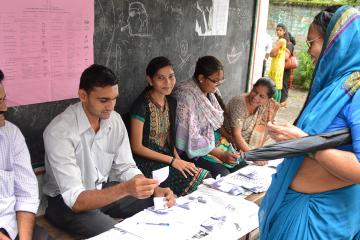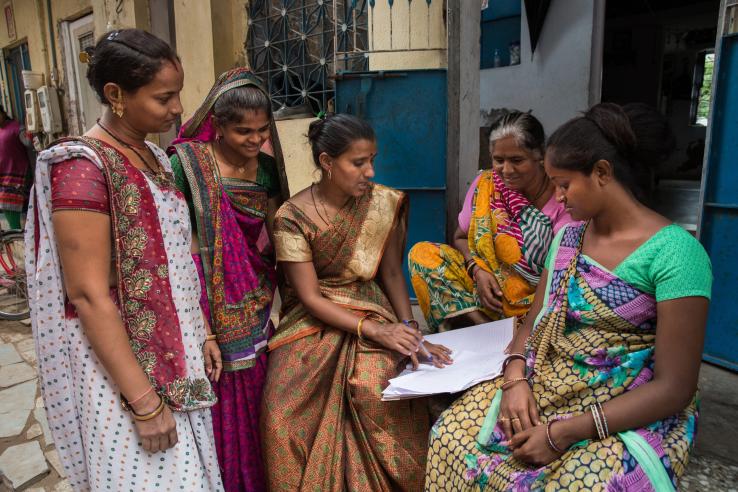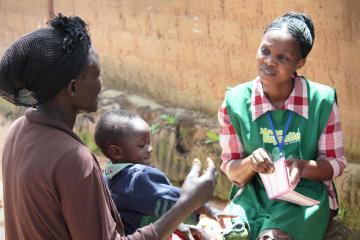
The promise of multidisciplinary collaborations for governance research

Effective governance is essential to reducing poverty—both in aligning the needs of citizens with the actions of states, and then ensuring that states have the capacity to meet those needs. Over the past 13 years, the Governance Initiative has funded over 100 evaluations to build the evidence base on what works to strengthen governance and accountability, improve service delivery, reduce corruption and leakages, and ultimately reduce poverty.
Our approach is grounded in economics and aims to uncover how incomplete information and misaligned incentives might result in politicians who aren’t responsive to the citizens who elected them, or bureaucrats who shirk the duties they’ve been assigned. This approach has helped us shed light on many important questions, ranging from equipping citizens with information to hold politicians accountable to reducing corruption so states can deliver essential programs.
As our research agenda has evolved in the last decade, researchers in J-PAL’s network have increasingly brought in frameworks, methodologies, and collaborators from outside the field of economics, and drawn on qualitative work, to explore these and other important questions and to better measure key outcomes. In recent years, randomized evaluations have leveraged multidisciplinary methods—particularly from psychology and behavioral science—to better understand the drivers of political behavior and government performance, including:
- the role of social and family networks on the spread of information, vote-buying behavior, political participation, and electoral outcomes;
- the role of motivation and social preferences on individuals’ performance as government workers or elected officials; and,
- the impact of ethnic, religious, and other identities on political preferences and electoral outcomes, among others.
We see these collaborations as more and more vital to conducting policy-relevant research: to study topics ranging from overcoming misinformation and polarization in politics, to deepening the inclusion of women and underrepresented groups, to building coalitions to mitigate climate change.
But researchers face many practical challenges in kickstarting these multidisciplinary collaborations, including finding collaborators with overlapping interests, bridging disciplinary language gaps, aligning publication incentives, and securing funding.
At J-PAL and on the Governance Initiative, we hope to help overcome some of these constraints. To that end, we are now offering dedicated funding for multidisciplinary work and convening like-minded researchers from across disciplines. In our efforts to date, we have seen promising directions for research emerge, on topics ranging from the role of religion and language in politics, women’s political participation, social media and social networks, and beyond.
Funding for multidisciplinary research
In January, the Governance Initiative concluded our 22nd round of funding. As part of this funding window, we offered small grants of up to $30,000 for multidisciplinary research, designed to cover (i) exploratory work that could lead to a randomized evaluation incorporating theory, methods, or analytical frameworks from disciplines outside economics or political science, or (ii) additional components on top of an existing randomized evaluation, including a new survey module, treatment arm, or qualitative fieldwork. We selected five projects–led by teams spanning psychologists, lawyers, linguists, and medical doctors–for their innovative approaches to studying drivers of political participation.
Two teams are incorporating insights from other disciplines to understand how linguistic identities and religious affiliation shape participation in politics in Africa. Researchers are conducting focus groups to scope a project on how pastors in evangelical churches are selected, how they influence local political institutions, and how they mobilize followers into a political agenda in the DRC. In Ghana, researchers will combine methods from economics and linguistics to investigate the barriers to electoral participation for ethnic minorities, and potential interventions to address them.
Another project will draw from psychology, including narrative persuasion and social learning theory, to develop edutainment content: researchers will develop and pilot a scalable radio drama to promote local political participation, especially by women, in Tanzania. The team is testing different subplots and messaging strategies, grounded in narrative persuasion and social learning theory, to determine which will most resonate.
In Myanmar, a team of social scientists and medical doctors is evaluating the impact of a psychosocial support program in ninety conflict-affected villages on mental health and wellbeing. With funding from GI, researchers are collecting a novel behavioral measure to study how service provision shapes political attitudes, civic engagement, and social cohesion. Finally, researchers from economics and legal studies will study the impact of timelier resolution of court cases in India—a context where judges and courts are overburdened—on bank lending and citizen welfare.
This is just the beginning of GI’s efforts to ease the financial constraints on multidisciplinary work. We look forward to sharing the findings from this promising research and to supporting further multidisciplinary collaborations in our Fall 2024 RFP.
Multidisciplinary researcher gathering
On December 4, 2023, GI organized an event to share cutting-edge multidisciplinary governance research and connect like-minded academics with an interest in conducting randomized evaluations. The conference highlighted impactful research on climate change, gender, and social media and social networks—areas that we see as ripe for multidisciplinary collaboration.
For example, even when women have equal political rights, and even when there are institutional reforms like gender quotas in place, restrictive gender norms may limit women’s political participation. Unpacking and countering these norms calls for collaboration among psychologists, sociologists, economists, and political scientists. During the event, political scientist Soledad Prillaman shared GI-funded research on the role of social networks in facilitating women’s political participation, and psychologist Anita Raj shared work to develop measures of gender empowerment that draws from psychology and behavioral science.
Another panel reviewed multidisciplinary approaches to the study of social media and social networks, highlighting examples related to mis/disinformation, polarization, and hate speech. The study of social media news consumption, and its impact on political attitudes and behaviors, is inherently multidisciplinary: psychology and neuroscience, for instance, shed light on how people process information about politicians. During the event, communications scholar Jennifer Pan and economist Carlo Schwarz discussed research on the impact of adapting the Facebook news feed and strengthening content moderation on polarization and hate crimes, respectively; Ro’ee Levy showed that consuming counter-attitudinal content on social media can decrease negative attitudes towards opposing parties.
Finally, tackling climate change requires collaboration between climate scientists and academics from a wide range of disciplines. Economists and political scientists, for instance, can shed light on designing market, regulatory, political, and governance institutions to mitigate climate change. A panel on climate and governance brought together researchers who offered different perspectives on how to build public and political support for climate action, like psychologist Madalina Vlasceanu, who presented findings from a 63-country mega-study that tested strategies, grounded in behavioral science, for increasing climate awareness and action.
In addition to the topical panels, economists Noam Yuchtman and Nava Ashraf, a J-PAL affiliated professor, and psychologist Michael Muthukrishna shared how multidisciplinary collaborations had strengthened their work. J-PAL Governance, Crime, and Conflict Initiative co-chair Oeindrila Dube presented her research, in collaboration with psychologists, on the cognitive demands of policing. A full list of speakers and presentations from the event is available here. Ultimately, the event created a forum for researchers to connect across different disciplines, with the goal of helping to matchmake collaborations.
Looking ahead
The success of the convening and the volume of multidisciplinary proposals to the Governance Initiative clearly show there is an appetite among researchers to work across disciplines to advance governance research. Looking ahead, we will again include dedicated grants for multidisciplinary collaboration as part of our Fall 2024 request for proposals, and hope to see proposals on these and other topics. We believe multidisciplinary collaborations can spark the innovative solutions that are needed to accomplish our complex mission of fostering effective, accountable governance through scientific evidence.
If you are an academic researcher in a discipline other than economics or political science, and are interested in partnering with a member of the J-PAL network to conduct a randomized evaluation related to governance and political participation, please reach out to the Governance Initiative team at gi@povertyactionlab.org.


